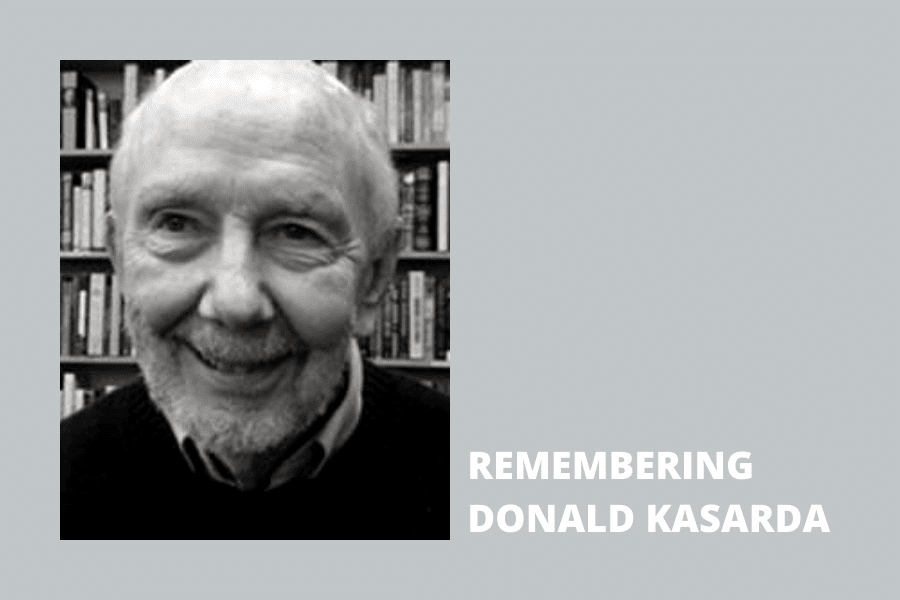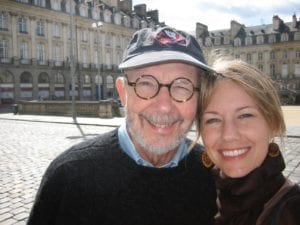Expert in wheat genetics and graciousness remembered for contributions to celiac disease research

By Amy Ratner, Director Scientific Affairs
If you are enjoying gluten-free food today, you owe some thanks to Donald Kasarda, who humbly identified himself as simply a retired gluten protein chemist. To many looking for answers about celiac disease and gluten in the days when so much was less known, he was so much more.
Don, 87, passed away in California February 12, prompting sadness throughout the celiac disease community, from fellow researchers, celiac disease advocates, physicians and people with celiac disease. There is probably no one working in celiac disease since at least the 1980s who didn’t go to Don for factual information about gluten and its role in celiac disease.
His list of accomplishments is long, but I wanted to start with my personal remembrance. Shortly after my daughter was diagnosed with celiac disease, I started writing for the first, upstart publication about the gluten-free diet and celiac disease. We were focused, then, on untangling information about where you would find gluten in mainstream products since there were so few that were specifically gluten-free aside from natural things like plain meat, fruit and vegetables. Figuring out which grains really belonged on the diet was even a challenge back then.
Don was always a reliable source, soft-spoken, armed with evidence and averse to speculation. What a great ally he made. We usually spoke on the phone. I only saw him in person a few times, but I was always glad to be approached at meetings about celiac disease by this tall, thin man, usually wearing a button-down shirt, crew neck sweater and horn-rimmed glasses.
We were on the phone once, talking about the potential for gluten content in some ingredient, when bad weather on his end made our connection fuzzy. So, he told me to hold on. He went onto the roof of his beloved laboratory to improve the reception and continued to give me the low down. It should be noted he was well into his 70s at the time. Meanwhile, I was back in the comfort of my home, picturing him, windblown, on the roof, and I was barely able to concentrate.
He has a daughter also named Amy, something he pointed out to me often when we talked. Maybe that helps explain the connection between us. Or maybe it was our shared interest in getting things right. In that regard, he was the expert who never called himself one.

Following are some things his daughter Amy Perrette told me when I asked her for a few comments about her father.
Don was born in 1933 in Wilkes Barre PA, the youngest of 8 children. His father died when Don was 7-years-old, and the family mainly lived off the money one of his older brothers earned as an Air Force pilot. While living at home he attended Kings College in Wilkes Barre and a wonderful chemistry professor sparked Don’s interest in the subject.
Upon graduating from Kings, Don said he didn’t feel “like he knew anything” except that he was interested in science so he managed to get into Boston College. There he flourished academically, though he barely had enough to eat. He could hardly believe it when he entered the doctorate program at Princeton. Rubbing elbows with Nobel laureates… living in the Ivy-covered graduate housing… not to mention taking meals at the dining hall (finally food!!)… these were all heady experiences for him and ones he was grateful for all his days.
After stints at Los Alamos and Bell Labs, he took a fellowship at Unversity of California San Francisco. There he met his wife Ferne. He enjoyed the work on proteins very much, but hated killing rabbits, so when the chance came to move to studying wheat proteins at the USDA-ARS Western Regional Research Center, he jumped at the chance. An absolute devotion to the subject was born, one which lasted to his last breath. He believed in the benefits of non-applied research, domestic and international collaboration, and in helping celiac patients and fellow scientists
“Indeed, he was a wonderful man and so passionate about science, the people who pursue science, and the people (patients) who most need the results of that research,” Amy wrote in an email about her father. ” He retained his lively brain until his last breath, and would be so happy to hear that his work and dedication were appreciated by colleagues and people from all walks of life.”
Over the years, Don mentored visiting scientists from many other countries who came to his lab to study the genetic basis of wheat quality. He also collaborated with medical groups to define the basis for the activity of the wheat proteins in celiac disease and served as an advisor to celiac disease patient support groups. Following his retirement in 1999, he continued on as a collaborator at WRRC and remained passionate about science, wheat gluten proteins and celiac disease.
Don was the author of more than 100 research publications and review chapters and received numerous awards for excellence in research during his career. He was awarded the Thomas Burr Osbourne Medal for distinguished contributions in the field of Cereal Chemistry in 1993. In 2002, he was one of those honored with the Rank Prize in recognition of his work on the molecular characterization of cereal seed storage proteins. He was also a member of the Beyond Celiac medical advisory council.
In 2013 and 2014, Don was quoted in news stories including those on National Public Radio and The New Yorker to refute those claiming that wheat had somehow changed over time to become more toxic.
Here’s what The New Yorker said: “Donald Kasarda, a researcher at the U.S. Department of Agriculture, has studied wheat genetics for decades. In a recent study published in the Journal of Agricultural and Food Chemistry, he found no evidence that a change in wheat-breeding practices might have led to an increase in the incidence of celiac disease. ‘My survey of protein content in wheat in the U.S. over approximately the past one hundred years did not support such an increase on the basis of historical data in comparison with recent data,’ he subsequently told an interviewer.” Don was always ready with the evidence, even about 15 years after his official retirement.
“Don brought a great deal to our community: deep knowledge of gluten from a chemical and agricultural perspective; curiosity about celiac disease and trends in diet over time; enthusiasm for science and the dissemination of knowledge; and generosity with his time,” said Benjamin Lebwohl, MD, director of clinical Research at the Celiac Disease Center at Columbia University. “He was always willing to share his unique perspective to help answer any question, large or small.”
“Dr. Kasarda was a dedicated scientist for more than 50 years and a recognized expert in wheat gluten proteins and celiac disease,” Tara McHugh, center director, USDA-ARS-WRRC, wrote in sharing news of Don’s death. “Don holds a special place in my heart. I treasure the memories of Don approaching me full of enthusiasm for a new research idea or question or a suggestion for the betterment of the center. He will also be remembered as a gracious and kind person.”
Indeed, he will.
Opt-in to stay up-to-date on the latest news.
Yes, I want to advance research No, I'd prefer not to